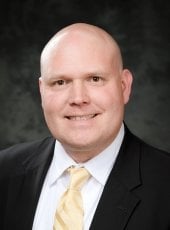Online Education for Working Professionals
Determine the risk of environmental load effects applied to structures.

Learn to address the likelihood of structural failure.
Perform risk analysis associated with environmental loads to structures under static
and dynamic loadings. Master the basics of performance-based design. Study large deformation
effects, post-yield behavior, non-standard geometries, and unusual geometries. Analyze
loads from wind, snow, and earthquake ground motion.
Request Info
How to Apply
3 courses in 3 semesters.
| Length |
3 courses in 2-3 semesters |
| Effort |
3 hours per credit per week |
| Each course |
3 credits |
| Total credits |
9 |
| Course type |
Online or on-campus |
| Modality |
Watch class recordings on demand |
| Cost |
Based on credits and course type |
| Already enrolled? |
Speak with your advisor |
Curriculum
Progress quickly with a compact curriculum. Work with the program advisor to select
courses that fit your interests and pre-requisite skills.
Prerequisites
Check your preparation. Here are some of the pre-requisite courses for this certificate,
depending on elective chosen. CEE 3710 or MA 3710 or equivalent is required. Review
the course descriptions for details.
CEE 3710 - Uncertainty Analysis in Engineering
Introduction to probability, statistics, and uncertainty analysis with examples from civil engineering (e.g. models of vehicle arrivals, structural reliability, flood distributions). Topics include: discrete probability theory, probability distributions, parameter estimation, confidence intervals, hypothesis tests, linear regression, and model selection.
- Credits:
3.0
- Lec-Rec-Lab: (3-0-0)
- Semesters Offered:
Fall
- Pre-Requisite(s): MA 2160
MA 3710 - Engineering Statistics
Introduction to the design, conduct, and analysis of statistical studies aimed at solving engineering problems. Topics include methods of data collection, descriptive and graphical methods, probability and probability models, statistical inference, control charts, linear regression, design of experiments.
- Credits:
3.0
- Lec-Rec-Lab: (0-3-0)
- Semesters Offered:
Fall, Spring, Summer
- Pre-Requisite(s): MA 2160 or MA 3160(C)
CEE 4201 - Matrix Structural Analysis
Analysis of trusses and frames by the direct stiffness method. Use of a typical commercial computer code is stressed as a tool for complex structures. Introduces three-dimensional structures.
- Credits:
3.0
- Lec-Rec-Lab: (0-2-2)
- Semesters Offered:
Fall, Spring
- Pre-Requisite(s): CEE 3202
CEE 5241 - Structural Dynamics
Free and forced vibration of undamped and damped single degree of freedom systems. Seismic design using the equivalent lateral force method. Introduction to multi-degree of freedom systems and transmissibility.
- Credits:
3.0
- Lec-Rec-Lab: (0-3-0)
- Semesters Offered:
Fall, Summer
- Pre-Requisite(s): CEE 4201(C) or CEE 5203(C)
Required Courses
Take a 3-credit required course.
CEE 5730 - Probabilistic Analysis and Reliability
Examines probabilistic analysis of engineering systems including first-order methods, Monte Carlo simulation, and time-to-failure analysis. Reliability analysis will include capacity/demand reliability and system reliability. Emphasis will be on civil and environmental engineering systems.
- Credits:
3.0
- Lec-Rec-Lab: (0-3-0)
- Semesters Offered:
Fall
- Pre-Requisite(s): CEE 3502 or CEE 3710 or MA 3710
Electives
Take 6 credits of elective courses.
CEE 4244 - Loads for Civil Structures
The course focuses on the theory and building code requirements for civil structural loadings that are used in design. The loads and load combinations will include dead loads, occupancy live loads, snow loads, wind loads, and seismic loads.
- Credits:
3.0
- Lec-Rec-Lab: (0-3-0)
- Semesters Offered:
Spring
- Pre-Requisite(s): CEE 3202
CEE 5242 - Advanced Structural Dynamics
Earthquake engineering and advanced dynamic analysis. Includes modal analysis, time history response of multiple degree-of-freedom systems, and base isolation.
- Credits:
3.0
- Lec-Rec-Lab: (0-3-0)
- Semesters Offered:
Spring
- Pre-Requisite(s): CEE 5241
CEE 5201 - Advanced Structural Analysis
The study of nonlinear structural analysis techniques, especially energy methods, applied to elastic buckling analysis, large deflections of beams, second-order effects in frames, and plastic analysis of steel structures.
- Credits:
3.0
- Lec-Rec-Lab: (0-3-0)
- Semesters Offered:
Fall, Spring
- Pre-Requisite(s): CEE 4201 or CEE 5203
Typical Schedule
The minimum completion time is three semesters. Here is a typical schedule.
| Fall 1 or 2 |
Spring 1 or 2 |
| CEE 5242 or CEE 5730 |
CEE 4244 or CEE 5201 |
Application Process and Admissions Requirements
Applications are reviewed on an individual basis using a holistic approach. Fill out
our free graduate application online to apply to any of our programs. Official transcripts and scores are not required
for the initial application, although you will need to upload them later.
Graduate School Admissions Process
Applying to the Graduate School is free (no application fees) and fast (no official transcripts, test scores, or letters needed to start). The application
process involves three easy steps.
See Admissions Steps
Graduate School Requirements
To be considered for admission to the Graduate School as a degree- or certificate-seeking student, you need to:
- have a bachelor's degree or its equivalent from an accredited institution, and
- be prepared for advanced study in your chosen field, as demonstrated by your previous
degree and your scholastic record.
See additional application requirements, including required materials:
Program Specific Requirements
Program Specific
- Admitted applicants typically have an undergraduate GPA of 3.0 or better on a 4.0
scale
- GMAT/GRE: Not required
- Preferred major: Civil, environmental or related degree
International Students
- TOEFL: Recommended Score of 79 iBT
- IELTS: Recommended Overall Band Score of 6.5
Admissions Decisions
Made on a rolling basis.
Prospective Students
- Prospective students and non-degree seeking students interested in obtaining a graduate
certificate must apply to the certificate program using the online application.
- Accelerated certificate options exist for current Michigan Tech undergraduate students in good standing and have
achieved at least junior-level standing or recent bachelor’s graduates of Michigan
Tech (less than two years).
- The number of credits earned prior to admission that can be counted are restricted.
Current Graduate Students
- Current Michigan Tech graduate students who are in a degree program do not need to formally apply. Current students must still submit the appropriate degree schedule in order to complete the certificate.
International Student Requirements
International Students must apply and be accepted into a degree-granting program in order to earn a graduate certificate. A non-refundable $10 processing fee per application is required.
See International Applicants
Interested in taking a single, online course? Enroll as a non-degree seeking student.
Upon completion of the certificate, students will be able to:
Evaluate hazard and risk for various structures subjected to natural events, including
earthquake, wind, and snow loads, and to improve the design and better communicate
risk to owners and the general public.
Michigan Tech was founded in 1885.
The University is accredited by the Higher Learning Commission and widely respected
by fast-paced industries, including automotive development, infrastructure, manufacturing,
and aerospace. Michigan Tech graduates deliver on rapid innovation and front-line
research, leaning into any challenge with confidence.
The College of Engineering fosters excellence in education and research.
We set out as the Michigan Mining School in 1885 to train mining engineers to better
operate copper mines. Today, more than 60 percent of Michigan Tech students are enrolled
in our 17 undergraduate and 29 graduate engineering programs across nine departments.
Our students and curriculum embrace the spirit of hard work and fortitude our founders
once had. Our online graduate courses are the same, robust classes taken by our doctorate
and masters candidates, taught directly by highly regarded faculty, with outstanding
support from staff. We invite working professionals to join these courses, bring their
own experience and challenges as part of the discussion. Leverage the national reputation
of Michigan Tech to advance your career in tech leadership.
Online Certified Instructors
Meet the online certified instructors. Students have the flexibility to review class
recordings later.

Teaching Statement
Dr. Dai teaches matrix structural analysis, advanced concrete materials, and finite element analysis.
View Profile

Teaching Statement
Dr. Darestani teaches courses in structural analysis and structural reliability.
View Profile

Teaching Statement
Dr. Dowden teaches courses in structural concrete design, prestressed concrete design, and advanced structural dynamics.
View Profile

Teaching Statement
Dr. Morse teaches sustainability and civil engineering practice, loads for civil structures, and structural dynamics.
View Profile

Teaching Statement
Dr. Swartz teaches on topics of steel design, structural timber design, continuous-system modeling, and advanced structural analysis.
View Profile





